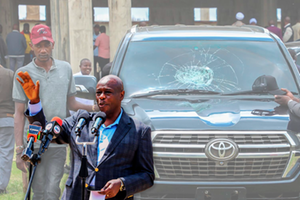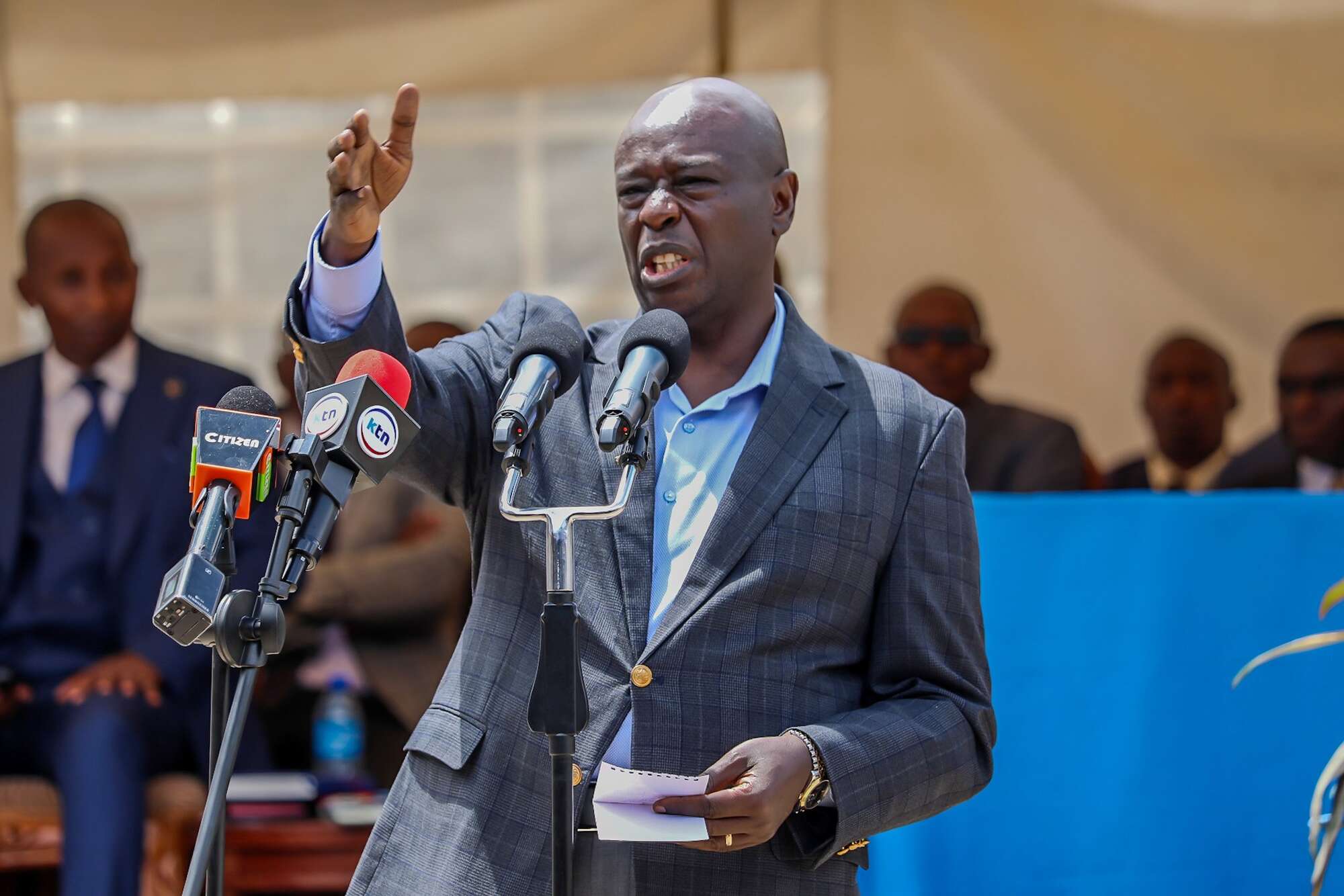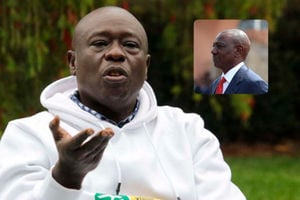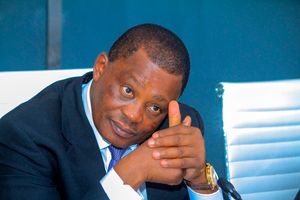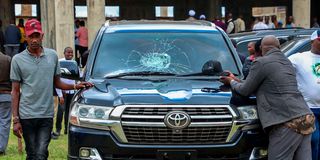
A vehicle with shattered windscreen following chaos during a church service attended by former Deputy President Rigathi Gachagua at PCEA Mwiki on April 6, 2025.a
Kenya is grappling with a renewed wave of confrontational politics marked by rising incidents of violence, smear campaigns and intolerance.
The Directorate of Criminal Investigations (DCI) on Monday announced it had launched investigations into cases of violence in various parts of the country. This followed the incident last Sunday in which goons confronted a congregation at PCEA Church in Mwiki, Nairobi, where former Deputy President Rigathi Gachagua and other leaders were in attendance.
“The ongoing investigations aim to bring to book those responsible for the regrettable incident, which is one among several that have been witnessed recently in various parts of the country,” a statement from the agency stated.
But as the police cautioned against the violence, about 400 kilometres away in Ndhiwa, Homa Bay county, two young men sustained serious injuries on Monday following a violent confrontation between factions in the ODM party ward polls.
Elaine Omondi, 25, lost his hand after it was chopped off using a panga, while David Oluoch sustained deep cuts on the neck and a fractured left arm after attacks by suspected hired goons at Buche Primary School, where the exercise was ongoing.
On Tuesday, the ODM party warned that stern action, including expulsion from the party, shall be taken against any member found culpable of planning violence in the ongoing grassroots polls. The party’s secretary for communication and publicity affairs Rahab Robi said that investigations had been launched into the incident, as well as violence that was witnessed in Kibra, Nairobi, and Kaptembwa in Nakuru County.
“We appeal to our members to maintain the highest degree of discipline, camaraderie and respect for each other,” read a statement by Ms Robi.
From the ODM and UDA grassroots elections marred by fistfights, to bitter fallouts within President William Ruto’s Kenya Kwanza that have led to toxic rhetoric, heckling of leaders and targeted attacks, the political climate has turned hostile, igniting fears of democratic backsliding and social division.
At the national level, mudslinging between rival camps is back with full force. From insults on public platforms to targeted smear campaigns online, politicians are prioritising character assassination over policy debate.
President Ruto recently stated that fake news is a growing threat to national security, coming after spy chief Noordin Haji said digital platforms are increasingly being used to fuel unrest. During the Second Mashariki Cooperation Conference in Naivasha last week, the President said: “False narratives, fabricated claims and cynical distortions corrode truth, distort public discourse and erode democratic institutions. When weaponised, social media platforms become breeding grounds for hate, incitement, radicalisation and insecurity.”

The destruction caused by unknown persons during a funeral attended by former Deputy President Rigathi Gachagua.
He spoke amid explosive allegations that have been made by former Public Service Cabinet Secretary Justin Muturi and Mr Gachagua. Without providing evidence, Mr Muturi last week claimed President Ruto had pressured him to sign a Sh129 billion deal with Russian oligarchs at a Dubai Airport, accusing the Head of State of being “irredeemably corrupt”.
But the President himself, without providing evidence, accused Mr Muturi of incompetence, and Mr Gachagua of having demanded Sh10 billion to guarantee him 2027 support in Mt Kenya region. In a brazen response, Mr Gachagua termed the claims “pathological lying” .
Prof Gitile Naituli of Multimedia University argued that Dr Ruto’s public fight with Mr Gachagua only reveals “a presidency under pressure”.
“President Ruto’s recent public attack on his former deputy, Gachagua, is not a display of strength—it is an admission of political vulnerability. In the high-stakes arena of power, true dominance is often exercised in silence. The fact that Ruto has chosen to address Gachagua’s accusations so directly signals that he is losing control of the narrative,” he said.
Several opposition figures have also decried harassment and arrests by State agencies, terming them attempts to silence dissent. Five political allies of Mr Gachagua were summoned by police over the violence at the PCEA church.
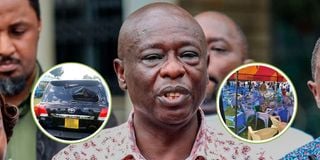
Former Deputy President Rigathi Gachagua. Inset: Gachagua's damaged personal car and (right) the scene of the burial ceremony in Limuru that was was rocked with chaos.
As Kenya inches closer to the 2027 General Election, political observers warn that the return of dirty politics could erode public trust in institutions and undermine democratic progress. With violence creeping into parties and leaders resorting to divisive rhetoric, there is growing pressure on both government and opposition actors to embrace tolerance, reform internal processes, and steer the country away from a dangerous path.
During an interview on Sunday, Mr Gachagua expressed fears that the church attack could evoke memories of the Kiambaa church attack in Eldoret at the height of the 2007/2008 post-election, a claim that could open new wounds.
The heckling that marred Dr Ruto’s tour of Nyandarua County last week, where National Assembly Majority Leader Kimani Ichung’wah faced the wrath of the public, could equally send wrong signals to other parts of the country.
Mumias East MP Peter Salasya, a fierce critic of President Ruto and ODM leader Raila Odinga’s broad-based government, was attacked by goons during a football match between Harambee Stars and Gabon at Nyayo National Stadium last month.
Similar incidents have been witnessed in Migori County, which is now viewed by residents as the “theatre of the absurd” as youth linked to Governor Ochilo Ayacko attack his opponents. On, March 16, supporters of Mr Ayacko confronted Uriri MP Mark Nyamita who is eyeing the county governor seat and attacked his supporters during a football match at Migori stadium. On February 22, violent goons attacked the same MP as he presided over a fundraiser at Dede SDA Church.
Suna West MP Peter Masara, a fierce critic of Mr Ayacko had also on Saturday May 11 been attacked by goons while attending a service at Sony SDA Church.
The violent goons have not spared presidential tours. In the week starting March 10, goons allegedly mobilised by politicians attacked and robbed residents during President Ruto’s tour of Nairobi. The incidents led to fears, with most traders being forced to close shops during such visits while PSV vehicles had to change their routes.
In Western Kenya, dozens of mourners were injured in February when goons linked to Governor Fernandes Barasa, Matungu MP Peter Nabulindo and former Cabinet Secretary Rashid Echesa clashed during a funeral in Matungu, causing massive property destruction.
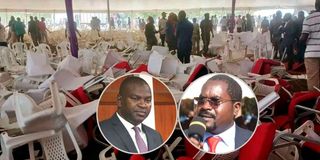
Chaotic scene after supporters of Kakamega Governor Fernandes Barasa and those of former Sports CS Rashid Echesa clashed during the burial of Augustine Odongo in Matungu, Kakamega County on 8 February 8, 2025. The family has rejected contributions from Mr Echesa (inset left), area MP Peter Nabulindo (right).
The suppliers of the burial ceremony slapped the bereaved family of the late senior chief Augustine Odongo with a Sh1.5 million bill to cater for damages caused to its property during the event. They claimed that their chairs were broken and tables were damaged during the ugly incident.
In January, goons in the company of former Mungiki leader Maina Njenga invaded a prayer meeting in Nyeri attended by Mr Gachagua’s spouse Dorcas Rigathi.
Former Vice-President Kalonzo Musyoka who is also the Wiper party leader had to be whisked away from Jaramogi Oginga Odinga Foundation in Nairobi in July last year during the Azimio la Umoja One Kenya Coalition’s Parliamentary Group meeting after youth linked to ODM attacked him. The youths, who said they would not allow any coalition principal to disrespect Mr Odinga, drove the leaders and journalists out of the compound, with some victims getting hit with plastic chairs. Mr Odinga was forced to offer his apologies following the incident.
These incidents, among a series of others, spell doom for the country ahead of the 2027 polls.
Political analyst Javas Bigambo argued that violence is being embraced by political factions for dominance, intimidation and to secure political power.
“With the 2027 election cycle approaching and expected to be highly competitive, it requires multiagency action to nip violence in the bud. The electoral commission, police, Judiciary, civil society, Parliament and active citizens must call out political leaders and parties that propagate any form of violence and other atrocities,” he said.
Church leaders, too, have been urging politicians and the public to practise tolerance.

